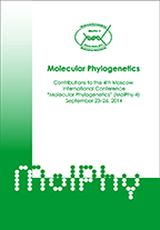| |
CONFERENCE CENTER
Explore, invent, connect
|
 |
|
|
 |
 |
 |
| |
Books catalog
|
Your shopping cart is empty |
A. Troitsky, L. Rusin, and N. Petrov «Molecular Phylogenetics: Contributions to the 4th Moscow International Conference «Molecular Phylogenetics» (Moscow, Russia, September 23-26, 2014)»


|
Year: 2014
Author(s): A. Troitsky, L. Rusin, and N. Petrov
ISBN: 978-5-94588-153-2
Pages: 90
Publisher: TORUS PRESS
|
Price:
2 000 RUB
Buy
Add to cart
Knowledge of phylogeny is of fundamental importance in evolutionary studies, from
the reconstruction of the tree of life to revealing and understanding the laws of body
plan formation (the evo-devo realm) and to describing the patterns and processes
of microevolution. The discipline of phylogenetics has evolved radically in the new
millennium, capitalizing on theoretical and methodological breakthroughs in analysis
and algorithms, on the exponential increase in molecular data, and on the availability
of vast computing power to enter the phylogenomic era. An integral part of contemporary phylogenetics is the development of mathematical models and effective algorithmic solutions to tackle highcomplexity computational problems of building evolutionary scenarios, inferring patterns of coevolution of molecules, pathways, regulation
systems, and species, assembling of sequence and tree data, etc. A solid methodological framework of phylogenomic analysis is emerging, applying data derived from
whole genomes to problems in deep phylogeny, functional genomics, speciation and
divergence, barcoding, and phylogeography. The mission of the IV Moscow International Conference «Molecular Phylogenetics» (MolPhy-4) is to provide a stimulating
platform for the exchange of ideas in such top areas of evolutionary research as evolutionary genomics, molecular phylogenetics and systematics, studies of complex traits
of coevolution of different genomic and proteomic elements and their ancestral reconstruction, modeling evolution in a contemporary framework of algorithmic and computer science. The acknowledged focus is to bridge new fundamental knowledge with
various applications like biodiversity studies, barcoding of biological objects, molecular ecology, epidemiology and anthropology, and other actively developing fields.
Additional information:
Back to the section
|
|
 |
 |
 |
|
|
|
|
|
All rights reserved. (C) Torus Press Ltd., 2007-2025
|
|
|
|
|